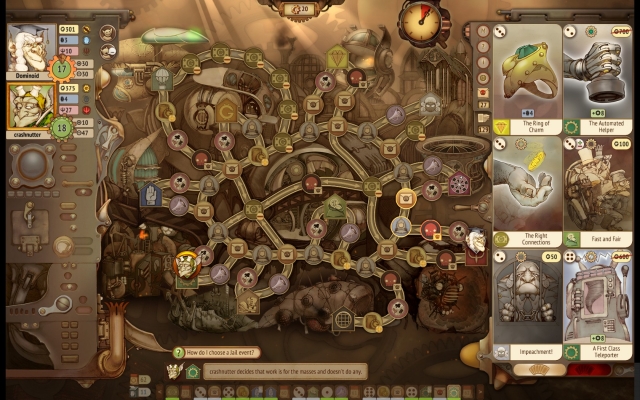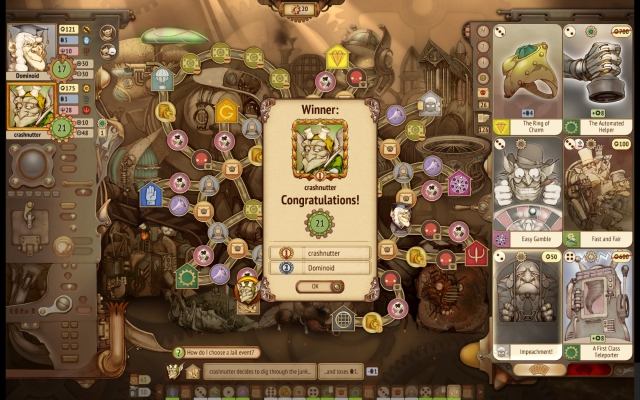
Gremlins, Inc Review
Random fact: Monopoly was created with the intention of making an anti-capitalist point. The plan was that players would realise one person taking over large areas of the city and charging extortionate rents was wrong and it would spark a social revolution. In fact, it didn’t make a blind bit of difference and London has even more extortionate Monopoly-esque rents than ever these days. In the steampunk world that Alexey Bokulev has created for Gremlins Inc, the titular green-skinned characters are masters of capitalism. This makes the game essentially a much eviller version of Monopoly, at least thematically. It’s a game which is cruel, unfair and downright Machiavellian; pretty much like the worst elements of capitalism.
You move around the board in a convoluted one-way type system, working towards special spots on which cards can be played. The board is littered with hazards such as bribe spots where you have to pay a certain amount to progress, the police waiting to arrest you (unless you bribe them) and “misfortune spots” that see bad things happen to you amongst others. The world of Gremlins, Inc. is a dangerous one, but with the right tactics, it can be tamed a bit.
There are four main resources in the game: points, votes, gold and malice. Points are the bread and butter of the game. Most of the ways to win involve scoring the largest amount of points. This can be the first to a particular score, the highest score after a certain amount of time or turns, or the game can end after all six of the special “chaos cards” have been played (more on these later). Votes are what determine the elections that take place every 20 turns. The winner of the elections become Governor, which means that they can’t be arrested from police squares, they don’t pay bribes, and they get to collect everyone else’s bribes. Gold is usually spent to play cards (the cards with the greater prizes need to be paid for, you can’t just make your way to the right spot and play it) or to buy bonuses along the way. Malice is a more negative resource. It occurs as a downside of doing some of the more evil things in game and the higher your malice, the higher your bribe is. There’s also a number of misfortunes that affect people worse the more malice they have. This is another trade-off mechanic. Some of the greater rewards have more malice attached so you have to weigh up the pros and cons of your actions.

Actions having both good and bad consequences is a recurring theme throughout this game. There are very few actions that have no downside to them and everything you do is a compromise. This in turn means that the game requires a lot of tactical forethought. You have to decide how you want to play. Do you want to build up your own stash of money or become Governor and steal it from your opponents? Are you going to keep your bribes low and save money or reap the rewards of the dangerous malice attracting cards? Save up to play that eight-point card or play loads of cheap two-point ones instead? Ultimately, there’s no right or wrong way to play.
This need to think ahead means that you need to keep an eye on everything going on. Your opponents’ actions could interfere with your own so if you see that might happen, you may need to get in there first and try and get them arrested. Whether it’s the nefarious deeds of your opponents, misfortune cards or just luck of the draw, there’s always something to get in the way so you need a backup plan at all times as the turn of one card could change everything.
Adding a bit more spice to the mix are the “chaos cards”. These are always available for all players and are always the same six cards. Once they’ve been used though, they are permanently out of the game. Most are expensive, causing you to spend a large number of votes or large amount of cash, and they all give you a great deal of malice for playing them. In order to play them as well, it’s necessary to visit “The Inferno”, which means you have to sacrifice all your cards and get a new hand of six. It’s one way to win very quickly as the point values of the cards are high, but there’s a lot of risk associated with it.
As well as the bread and butter multiplayer (which can be local, remote or against AI) the game gives you a number of single player challenges. These range from simple things like winning in so many turns or obtaining a certain number of points, to more complex games where you have to win with a number of additional odds stacked against you. There might be no escape from jail cards or richer opponents. These will serve players who want to master the game well as they teach you more advanced techniques which you can use in multiplayer games to turn things to your advantage.

The hustle and bustle of a city that never sleeps is captured incredibly well here. From the random murmurings of crowds to the intricate board decoration, the game makes no bones about being organised chaos. If you’re a fan of nice simple board games like Guess Who? and Connect Four, then you probably won’t like this. If you’re the sort of person to spend the entire evening getting wood for sheep in Settlers of Catan though, this is likely to be right up your street.
Just from my descriptions of the rules, it’s probably pretty obvious that this is a game which requires a lot of thought to get the most out of it, so expect to spend many hours practicing before you feel like you’re good at it. It’s incredibly complex and this is the main reason that the developer has chosen a digital game rather than a cardboard version. This is a game that would probably work as a board game, but with so much changing in the game and so many resources to manage, it would undoubtedly be a headache. It’s hard enough working out what is going on in this version!
Ultimately, this is a game which will not be for everyone. That high level of complexity will be a barrier to a lot of players. But if you have the patience and desire to spend a lot of time picking through the intricacies of the game, then it’s a very rewarding experience and one which I heartily recommend.
Gremlins, Inc. (Reviewed on Windows)
This game is great, with minimal or no negatives.
Random fact: Monopoly was created with the intention of making an anti-capitalist point. The plan was that players would realise one person taking over large areas of the city and charging extortionate rents was wrong and it would spark a social revolution. In fact, it didn’t make a blind bit of difference and London has even more extortionate Monopoly-esque rents than ever these days. In the steampunk world that Alexey Bokulev has created for Gremlins Inc, the titular green-skinned characters are masters of capitalism. This makes the game essentially a much eviller version of Monopoly, at least thematically. It’s a game which is cruel, unfair and downright Machiavellian; pretty much like the worst elements of capitalism. You move around the board in a convoluted one-way type system, working towards special spots on which cards can be played. The board is littered with hazards such as bribe spots where you have to pay a certain amount to progress, the police waiting to arrest you (unless you bribe them) and “misfortune spots” that see bad things happen to you amongst others. The world of Gremlins, Inc. is a dangerous one, but with the right tactics, it can be tamed a bit. There are four main resources in the game: points, votes, gold and malice. Points are the bread and butter of the game. Most of the ways to win involve scoring the largest amount of points. This can be the first to a particular score, the highest score after a certain amount of time or turns, or the game can end after all six of the special “chaos cards” have been played (more on these later). Votes are what determine the elections that take place every 20 turns. The winner of the elections become Governor, which means that they can’t be arrested from police squares, they don’t pay bribes, and they get to collect everyone else’s bribes. Gold is usually spent to play cards (the cards with the greater prizes need to be paid for, you can’t just make your way to the right spot and play it) or to buy bonuses along the way. Malice is a more negative resource. It occurs as a downside of doing some of the more evil things in game and the higher your malice, the higher your bribe is. There’s also a number of misfortunes that affect people worse the more malice they have. This is another trade-off mechanic. Some of the greater rewards have more malice attached so you have to weigh up the pros and cons of your actions. Actions having both good and bad consequences is a recurring theme throughout this game. There are very few actions that have no downside to them and everything you do is a compromise. This in turn means that the game requires a lot of tactical forethought. You have to decide how you want to play. Do you want to build up your own stash of money or become Governor and steal it from your opponents? Are you going to keep your bribes low and save money or reap the rewards of the dangerous malice attracting cards? Save up to play that eight-point card or play loads of cheap two-point ones instead? Ultimately, there’s no right or wrong way to play. This need to think ahead means that you need to keep an eye on everything going on. Your opponents’ actions could interfere with your own so if you see that might happen, you may need to get in there first and try and get them arrested. Whether it’s the nefarious deeds of your opponents, misfortune cards or just luck of the draw, there’s always something to get in the way so you need a backup plan at all times as the turn of one card could change everything. Adding a bit more spice to the mix are the “chaos cards”. These are always available for all players and are always the same six cards. Once they’ve been used though, they are permanently out of the game. Most are expensive, causing you to spend a large number of votes or large amount of cash, and they all give you a great deal of malice for playing them. In order to play them as well, it’s necessary to visit “The Inferno”, which means you have to sacrifice all your cards and get a new hand of six. It’s one way to win very quickly as the point values of the cards are high, but there’s a lot of risk associated with it. As well as the bread and butter multiplayer (which can be local, remote or against AI) the game gives you a number of single player challenges. These range from simple things like winning in so many turns or obtaining a certain number of points, to more complex games where you have to win with a number of additional odds stacked against you. There might be no escape from jail cards or richer opponents. These will serve players who want to master the game well as they teach you more advanced techniques which you can use in multiplayer games to turn things to your advantage. The hustle and bustle of a city that never sleeps is captured incredibly well here. From the random murmurings of crowds to the intricate board decoration, the game makes no bones about being organised chaos. If you’re a fan of nice simple board games like Guess Who? and Connect Four, then you probably won’t like this. If you’re the sort of person to spend the entire evening getting wood for sheep in Settlers of Catan though, this is likely to be right up your street. Just from my descriptions of the rules, it’s probably pretty obvious that this is a game which requires a lot of thought to get the most out of it, so expect to spend many hours practicing before you feel like you’re good at it. It’s incredibly complex and this is the main reason that the developer has chosen a digital game rather than a cardboard version. This is a game that would probably work as a board game, but with so much changing in the game and so many resources to manage, it would undoubtedly be a headache. It’s hard enough working out what is going on in this version! Ultimately, this is a game which will not be for everyone. That high level of complexity will be a barrier to a lot of players. But if you have the patience and desire to spend a lot of time picking through the intricacies of the game, then it’s a very rewarding experience and one which I heartily recommend.













COMMENTS